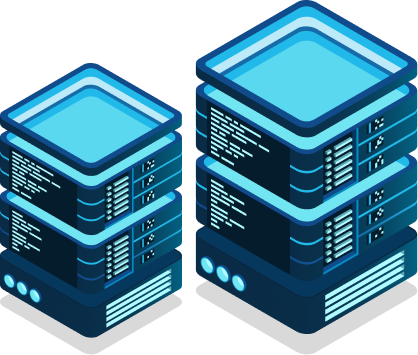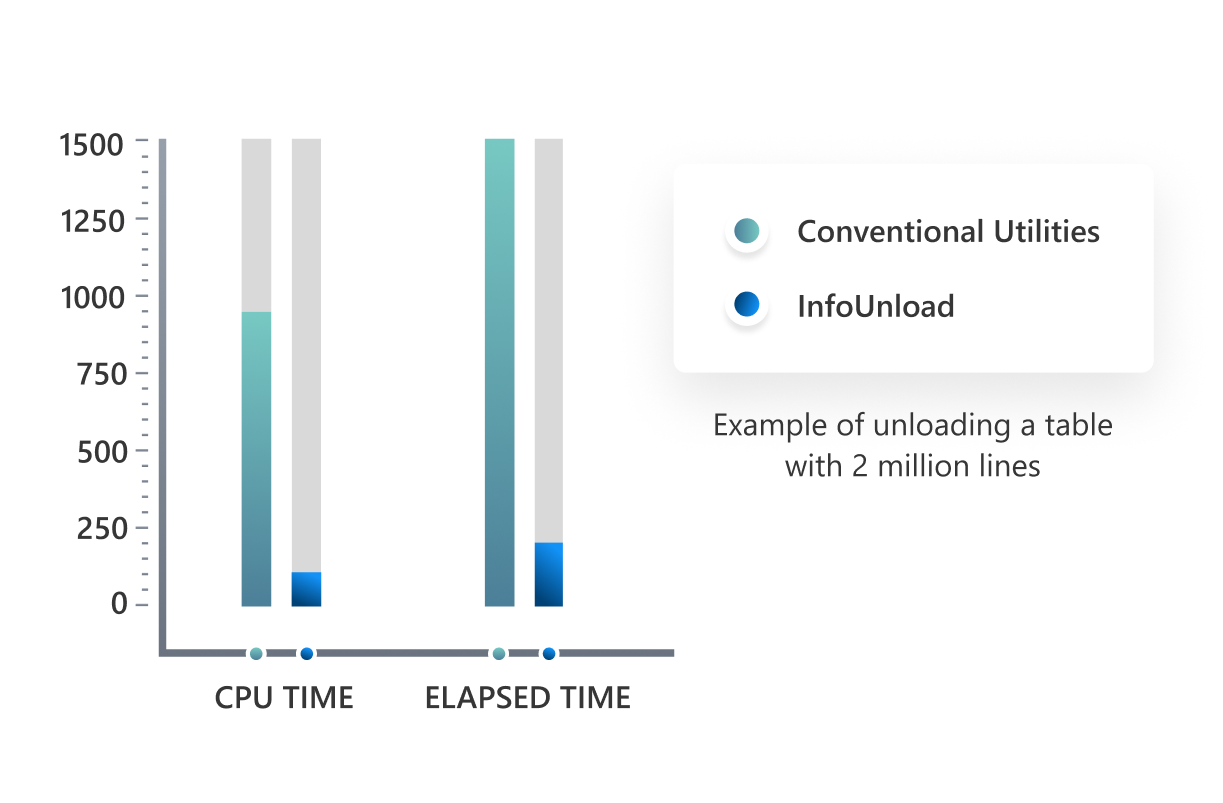InfoUnload is a high-speed data unload tool for Db2 for z/OS that increases performance of your unload processes by reducing processor consumption and the amount of I/O needed. InfoUnload is 100% compatible with the syntax of standard IBM utilities and the other major tools in the market. There is no additional investment required to spend on training or to implement InfoUnload, facilitating a seamless integration into your current systems.
Features of InfoUnload
Parallel processing at unparalleled speed
InfoUnload’s parallel processing enables large datasets to process multiple data partitions simultaneously. This feature is critical for environments with massive Db2 for z/OS tables, ensuring quick and effective unloading even during the most demanding times.
Accelerate your data management 10x faster than native Db2 for z/OS utilities with parallel processing architecture. It provides high performance, high speed and reduces unload costs by decreasing CPU time and the number of I/Os.
Continuous operation of utilities with zero downtime
Applications maintain constant, uninterrupted read/write access to data during load and unload processes.
Unload from a Full Image Copy
By unloading data from a full image copy, InfoUnload helps minimize the impact on the operational database, minimize resource consumption, and enhance overall performance.
This feature of InfoUnload allows for efficient data processing during data migration, reporting, or recovery processes.
Ability to unload selected rows and columns
The ability to unload selected rows and columns refers to the feature that allows users to extract only specific data from a larger dataset rather than unloading the entire database.
This feature reduces the processing workload and minimize CPU and I/O resource consumption.
Create output in multiple formats during a single unload operation
InfoUnload creates output in various formats, including CSV, fixed-width, or custom-delimited files, depending on the needs of the target systems.
Generate load-control statements for subsequent reloads
After unloading, InfoUnload can generate load-control statements for reloading the data quickly, making it easier to maintain continuity even when maintenance or system updates are required.
Features of InfoUnload
Parallel processing at unparalleled speed
InfoUnload’s parallel processing enables large datasets to process multiple data partitions simultaneously. This feature is critical for environments with massive Db2 for z/OS tables, ensuring quick and effective unloading even during the most demanding times.
Accelerate your data management 10x faster than native Db2 for z/OS utilities with parallel processing architecture. It provides high performance, high speed and reduces unload costs by decreasing CPU time and the number of I/Os.
Continuous operation of utilities with zero downtime
Applications maintain constant, uninterrupted read/write access to data during load and unload processes.
Unload from a Full Image Copy
By unloading data from a full image copy, InfoUnload helps minimize the impact on the operational database, minimize resource consumption, and enhance overall performance.
This feature of InfoUnload allows for efficient data processing during data migration, reporting, or recovery processes.
Ability to unload selected rows and columns
The ability to unload selected rows and columns refers to the feature that allows users to extract only specific data from a larger dataset rather than unloading the entire database.
This feature reduces the processing workload and minimize CPU and I/O resource consumption.

InfoUnload reduces Unload times by a factor of up to 10 when compared with the standard products.


InfoUnload reduces Unload times by a factor of up to 10 when compared with the standard products.
Industries
In industries where downtime can lead to significant financial losses and operational disruptions, InfoUnload's high-speed data unload capabilities, combined with minimal processor and I/O consumption, safeguard uninterrupted performance, ensuring that critical processes keep running smoothly without any disruption.
Why Organisations Need InfoUnload
- There’s a huge urge for organisations to ensure that their key applications are available 24/7 to the users.
- Businesses face challenges in managing large and growing databases with respect to loading, reloading, transferring, and integrating data, which involves significant cost.
- Developing different applications like ERP, CRM requires converting data that often runs on different platforms or systems.
- Data additions, deletions, and upgrades lead to disorganisation of tablespaces and Db2 index spaces.
- Significantly reducing processing time is becoming a major challenge.
Benefits of InfoUnload
Faster Unloading
The fastest unload tool in the market
Lower Unload Costs
InfoUnload can lower unload costs by reducing CPU time and the number of I/Os.
Advanced Formatting
The Advanced formatting feature allows users to tailor the data export to meet specific requirements, making it easier to integrate with other systems, perform data analysis, or reload data into databases.
Data Conversion
InfoUnload’s data conversion features allow the unloaded data to be formatted in a way that is compatible with non-Db2 databases, such as Oracle, SQL Server, MySQL, or even flat-file systems. The format includes CSV, XML, or custom-delimited, making it easier to integrate data into different systems and platforms. This flexibility is especially useful for organisations that need to transfer data between environments with different standards without any significant delays or performance degradation.
Granular Data Selection
You can easily unload only the rows and columns that you need.
Compatible with IBM Utilities
It is compatible with IBM utilities, offering additional capabilities for high-speed data unloading from Db2 for z/OS.
Faster Unloading
The fastest unload tool in the market
Lower Unload Costs
InfoUnload can lower unload costs by reducing CPU time and the number of I/Os.
Advanced Formatting
The Advanced formatting feature allows users to tailor the data export to meet specific requirements, making it easier to integrate with other systems, perform data analysis, or reload data into databases.
Data Conversion
InfoUnload’s data conversion features allow the unloaded data to be formatted in a way that is compatible with non-Db2 databases, such as Oracle, SQL Server, MySQL, or even flat-file systems. The format includes CSV, XML, or custom-delimited, making it easier to integrate data into different systems and platforms. This flexibility is especially useful for organisations that need to transfer data between environments with different standards without any significant delays or performance degradation.
Granular Data Selection
You can easily unload only the rows and columns that you need.
Compatible with IBM Utilities
It is compatible with IBM utilities, offering additional capabilities for high-speed data unloading from Db2 for z/OS.
 Infotel, là où vous êtes
Infotel, là où vous êtes

